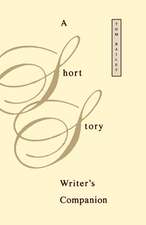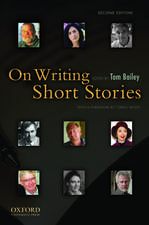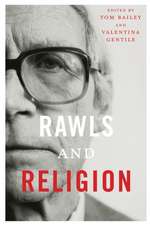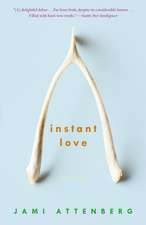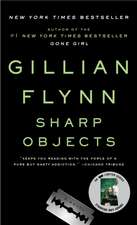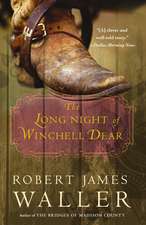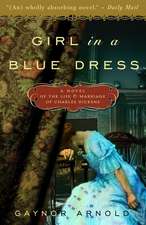The Grace That Keeps This World
Autor Tom Baileyen Limba Engleză Paperback – 30 iun 2006
The Grace That Keeps This World is a story about family, community, and the shared values that underlie and sustain human relationships. And ultimately, it is a tale of profound loss, human fallibility, and the love—romantic, neighborly, or familial—that can sometimes blur our line of vision.
A Book Sense pick
Includes a new essay by the author and a preview chapter of his forthcoming novel, Cotton Song.
Preț: 103.44 lei
Nou
Puncte Express: 155
Preț estimativ în valută:
19.79€ • 20.72$ • 16.38£
19.79€ • 20.72$ • 16.38£
Carte disponibilă
Livrare economică 17-31 martie
Preluare comenzi: 021 569.72.76
Specificații
ISBN-13: 9780307238023
ISBN-10: 0307238024
Pagini: 303
Dimensiuni: 132 x 203 x 18 mm
Greutate: 0.27 kg
Editura: Three Rivers Press (CA)
ISBN-10: 0307238024
Pagini: 303
Dimensiuni: 132 x 203 x 18 mm
Greutate: 0.27 kg
Editura: Three Rivers Press (CA)
Notă biografică
Tom Bailey is the author of Crow Man, a collection of short stories, and A Short Story Writer’s Companion, and the editor of On Writing Short Stories. He lives with his wife and three children in Selinsgrove, Pennsylvania, where he teaches in the creative writing program at Susquehanna University. This is his first novel.
Extras
Gary Hazen
The dark green Jeep Cherokee with the yellow-and-gold D.E.C. police seal on its door turns off the log road, bumping the rut, and powers up into the cut's landing. It's my younger son, I expect, nineteen-year-old, blond Kevin, who promised me he'd be here by noon, home from school for the weekend to help us get in the last of this wood. But it's that new lady environmental conservation officer, Josephine Roy, always busy scouting around our North Country, who's somehow managed to find us at work out here on this tiny twenty-four-acre private parcel inside of Hamilton County's blue-lined million-acre part of the park.
It's past lunch, after 1:00, and when I see who it is, who it isn't, the Stihl 034 in my hands grumbles, and I return to my work. Rocking the blade of the chain saw back, I give it the juice, slice forward, the honed sharpness singing into the wood. Chips spit past the goggles that mask my glasses. You can't be too careful.
Kevin's brother, my older son, dark, curly-headed Gary David, stands behind me steadying the trunk of the tree-sized limb, but hustles around to the front at the end of my cut to ease the log's falling, helping not to let it pinch the blade. Forced to work the jobs of two men, he catches the log as it falls, before it can drop, lopped off into the snow, and turns and tosses it on top of the mounding pile sinking the springs of our rusted old, red and white, half-ton F250 Ford. He then steps quickly back around me again to steady the limb for the next cut--right where I need him, when I need him, no waiting around. And there's no time to wait. We've got wood to get in--always I can hear Kevin say, being smart, now that he's a college man, he's always being smart--there's always work to be done.
Trouble is, this morning we woke to another two-inch dusting of snow, and gun season starts next Saturday. We're hot in a race against the coming North Country cold, caught between a rock and a hard place of the dual necessities of getting in this waste of good wood before the big snows begin and bagging our limit of deer to help us make it through one of these no-fooling winters again. Both Kevin and Gary David know the importance of these two needs because I brought up both my boys to know them. The way we choose to live we have no choice. We have to work when the working's good, not when we want to. If we want to be warm and eat, that is.
For us deer season's not a matter of mounting a staring head or congratulating ourselves over a rack of horns. For us hunting's as crucial as surrounding every inch of spare space under our extrawide porch and eaves with carefully cut, split, and cured wood--never imagining, not even able to imagine nor capable of comprehending in the blistering chain-saw heat of summer, that we could ever in twelve straight hard winters use all we've stacked, and then and again be stumped equally as incredulous every May when we have to scrabble up the last skinny sticks and shavings of bark to heat up the freezing kitchen at 5:00 a.m. This one single and unforgiving truth, out of which the responsibility I'm speaking of was born: that it's already time to start the dragging and sawing and splitting again that very same afternoon if we're going to be ready for the first freeze come September. It's all about living up here--surviving--and so far as I'm concerned there's no difference between the two, but it's a huge difference between us Hazens and other folks who don't know or have any idea at all about the cold.
Officer Roy parks in the clearing and climbs out of her shiny-new Jeep. The vehicle is fully equipped with red bar lights and two shiny silver spotlights above each sideview, antenna for the radio, and a shotgun resting on the rack against the Plexiglas that cages off the tan leather back seats. She starts up the slope toward us, carefully picking her way through the maze of sheared stumps and left limbs. Before this block of trees got singled out to be felled, their reaching limbs held up a cathedral-like, beamed canopy, a forest ceiling of hallowed hemlock. Now the clear-cut, crowded with the aftermath ugliness of stumps, the forest floor churned by the turning treads of the skidders that dragged out the logs, looks like a hot spot where we might have got ourselves dropped, a war zone--the blasted jungles where I served my hitch in Vietnam--a hell of a place, for sure.
The massacre happened right here at our feet, the bodies of hundreds of hemlocks hacked up, every single limb lopped. The valuable trunks were carted off on the flatbeds of the heavy logging trucks with the name Pollon Enterprises slanted in red, white, and blue down the doors. Pollon Enterprises is owned by Armound Pollon. His crew of Upper Lake Frenchmen came in here to do the job I refused to. They simply left behind the remains, the scraps they couldn't make "real money" on, thousands of limbs toppled over each other, in every twisted position, unlikely as they fell. The only good news in the wake of this slaughter is that these left limbs won't go to waste, not if I have anything to say about it. Waste not, want not was my father's motto.
I bump the safety bar against my hip, and the sudden silence rings out even louder than the high whining of the saw. Gary David looks up at me and then follows my gaze down the slope. Into that ringing silence, I stand, arching against the growing stiffness in my lower back. I've reached the age I can remember my father reaching when he needed me, the son he'd raised. I take the blade guard Gary David is waiting to hand me and slide it on, leave the heft of the saw between my feet. I rest my goggles on top of my head and swipe the sweat off my face with the sleeve of my mackinaw.
"Officer Roy."
"Mr. Hazen," she says, looking up at me as she crests the knoll, a touch out of breath. It's a steep climb. She's wearing mirrored aviator sunglasses, and she flashes past me to silver her eyes at my son.
"Gary David."
Josephine Roy acts years older than she looks. I'd read in the Lost Lake Gazette that she graduated from college the spring before last before spending a summer at the Academy learning to become an ECO. Now she's been here almost a year, the rookie officer in our woods. She and my Gary David must be about the same age, twenty-four or so, though Officer Roy appears more mature. It's not her face, smooth and girlish milk-white skin, untouched as yet like my Gary David's by years of summer-fall-winter-spring winds and rains and snow and sun, by the experience of caring for things she feels she must protect and sometimes can't--though looking around this clearing might start to etch a line or two on her. It's her uniform, I guess.
Officer Roy's got on her usual getup, a dark green shirt and standard-issue, pressed pants, with black stripes down the legs, her earned Eagle Scout-like Adirondack Park patch, the brass belt buckle, buffed shiny, and a 9-mm Glock pistol strapped to her waist, clean mud boots, and her Smokey-the-Bear hat with the tight chin strap that she wears angled down just right, sporting her authority. Her dark hair is cut short. Sunglasses hide her baby blue eyes from us, but she can't powder over the mess of freckles bridging her nose that make her look like a kid who ought to have her picture on the back of a cereal box. Though she's petite, the last two giant strides she takes before she sets her hands on her holster in front of us make her seem bigger, a mighty mite--sure, her mouth set stretched straight across, determined. There's never been any doubt about how seriously Officer Roy takes her job, all business about the weight of being an armed ECO in our woods. But I made sergeant during my tour, and a good rule of thumb I learned for myself is to be wary of all badged or ranked authority, whether they act friendly or not. Officer Roy puts me in mind of that sort of eager, fresh-faced, young officer, first lieutenant type on whom I often had to stake my life and the lives of my men. She appears to be in charge.
One thing's for sure, the new ECOs like Roy are a different breed than the old game wardens like Brad Pfeiffer used to be. Brad was first and foremost a woodsman, an avid hunter himself. ECOs, as they're officially called these days, are trained ready to act more like troopers--they go through shotgun, rifle, and stick certification as well as evasive driving, DWI, and drug detection. Similar to the sorts of officers who get hired and specially trained to work for the State Highway Patrol, who pull you over to give you a ticket and never even smile at the tough luck of having gotten caught speeding, no talking to them about how fast you were going or why, the law to an ECO like Roy is something written down as a straight ordinance or code and not subject to compromise or one lick of common sense.
One day this past spring I emerged empty-handed from a twelve-hour day hunting turkey deep in the woods only to find Officer Roy had left me her calling card of an orange traffic violation tucked under my windshield wiper, even though I was parked on the incline of a logging switchback miles from a paved public road. My inspection sticker had lapsed one month!
Brad Pfeiffer was a game warden up here for thirty-seven years, and when Brad passed by the truck of a hunter he knew, he kept going. A hunter's reputation mattered back when. Not anymore. Officer Roy couldn't care less about anyone's hard-won reputation of being a conscientious hunter in these woods. She'd as soon give me a citation as she would Lamey Pierson, who is a convicted poacher. Officer Roy does the busywork of checking up on everyone's licenses and inked tags, including our own, though in my estimation we'd all be better served up here if she saved that sort of thing for when the weekend blasters from downstate come carpooling up to our North Country to turn the first day of gun season into a shooting gallery, the carnival for the killing they think of as fun.
"I won't keep you," she says right off. "I know how busy you are. I just have a few questions I'd like to ask."
"Go ahead," I say.
"Are you all set for the opening of gun season next Saturday? Do you have your licenses?"
"Of course." I shrug. "We've had ours. Since March."
I'm joking. We bought our licenses last Saturday like most everyone else, the year's hunting license good from October 1. You have to buy them direct from Mabel Dix at Town Hall, and she doesn't sell licenses early and never has. With Officer Roy's rule-book mind, these are facts I know she's more than well aware of, but Officer Roy acts as if I'm playing it straight, as if she's taken me at my word and what I say can and will be used against me. And then without even looking at Gary David, she asks me, "Are both of your sons going?"
"Unless you know something I don't!"
At this line of questioning, I can't help but grin over my shoulder at my older son, but Gary David's gone busy craning his neck around, looking everywhere he can, at the mash of snow and leaves under our feet, the close, graying sky, the trees. He coughs into his fist. He's acting so antsy, he makes me glance around, feeling itchy myself.
Officer Roy hasn't looked away. She crosses her arms, still focused on me. And then she points the question of it straight at my chest and pulls the trigger, point-blank: "And your wife, Susan?"
I nod. "Sure," I say.
"She took the hunter safety course and bought a license last year?"
"Yes."
"And the year before that?"
"No. That's why she took the safety course last year. It was her first year out."
"Her first hunt, and she took a buck?"
"Not bad, huh? A hundred-and-sixty-pound eight-point."
"Not bad at all." It's Officer Roy's turn to nod now, her bottom lip pushed out, and then she says, a series of statements disguised as questions, her thinking out loud to herself, trying to pin me down: "But last year was her first year? She never took a license to tag a buck when Brad Pfeiffer was game warden? Now, I wonder why that is?"
I thumb back at tall, gangly Gary David. "Well, Officer Roy, another buck in the freezer makes a big difference when you have grown sons like this one still living at home to feed."
Officer Roy uncrosses her arms and hooks her thumbs through her belt loops, listening down at her boots. When she looks up, she says, "I just wanted to make sure I had the number of licenses right. Before Brad retired as warden you only bought three licenses and filled three tags, but since I started last season, you've purchased four licenses and filled four buck tags."
She goes silent, thinking, and then she says: "You all were good friends, weren't you, you and Brad?"
And that's when Gary David clears his throat and pipes up out of nowhere, surprising all of us, most of all, I imagine, himself: "You know we take our hunting pretty seriously, Officer Roy."
She lights her eyes on him then, and a ray of sun catches the mirrored lenses and bulbs brightly as if she's flashed a photograph to book us, me and my older son left standing in the wreck of shoved snow and mud surrounded by the aftermath stumped devastation of the clear-cut.
"I know you do," she says. "I respect that. But as serious hunters I know you know the law as well as I do: one buck per person, one person per tag, and you can't fill in someone else's tag. That's the law." She sets her hands on her holster again. "I guess I wasn't aware that Susan hunted. I thought she had a reputation around Lost Lake as more of a gardener."
"Well," I say and shrug, try a grin. "Susan is a Hazen, Officer Roy."
Officer Roy stretches her lips back at me without managing to actually smile. "I know," she says.
From the Hardcover edition.
The dark green Jeep Cherokee with the yellow-and-gold D.E.C. police seal on its door turns off the log road, bumping the rut, and powers up into the cut's landing. It's my younger son, I expect, nineteen-year-old, blond Kevin, who promised me he'd be here by noon, home from school for the weekend to help us get in the last of this wood. But it's that new lady environmental conservation officer, Josephine Roy, always busy scouting around our North Country, who's somehow managed to find us at work out here on this tiny twenty-four-acre private parcel inside of Hamilton County's blue-lined million-acre part of the park.
It's past lunch, after 1:00, and when I see who it is, who it isn't, the Stihl 034 in my hands grumbles, and I return to my work. Rocking the blade of the chain saw back, I give it the juice, slice forward, the honed sharpness singing into the wood. Chips spit past the goggles that mask my glasses. You can't be too careful.
Kevin's brother, my older son, dark, curly-headed Gary David, stands behind me steadying the trunk of the tree-sized limb, but hustles around to the front at the end of my cut to ease the log's falling, helping not to let it pinch the blade. Forced to work the jobs of two men, he catches the log as it falls, before it can drop, lopped off into the snow, and turns and tosses it on top of the mounding pile sinking the springs of our rusted old, red and white, half-ton F250 Ford. He then steps quickly back around me again to steady the limb for the next cut--right where I need him, when I need him, no waiting around. And there's no time to wait. We've got wood to get in--always I can hear Kevin say, being smart, now that he's a college man, he's always being smart--there's always work to be done.
Trouble is, this morning we woke to another two-inch dusting of snow, and gun season starts next Saturday. We're hot in a race against the coming North Country cold, caught between a rock and a hard place of the dual necessities of getting in this waste of good wood before the big snows begin and bagging our limit of deer to help us make it through one of these no-fooling winters again. Both Kevin and Gary David know the importance of these two needs because I brought up both my boys to know them. The way we choose to live we have no choice. We have to work when the working's good, not when we want to. If we want to be warm and eat, that is.
For us deer season's not a matter of mounting a staring head or congratulating ourselves over a rack of horns. For us hunting's as crucial as surrounding every inch of spare space under our extrawide porch and eaves with carefully cut, split, and cured wood--never imagining, not even able to imagine nor capable of comprehending in the blistering chain-saw heat of summer, that we could ever in twelve straight hard winters use all we've stacked, and then and again be stumped equally as incredulous every May when we have to scrabble up the last skinny sticks and shavings of bark to heat up the freezing kitchen at 5:00 a.m. This one single and unforgiving truth, out of which the responsibility I'm speaking of was born: that it's already time to start the dragging and sawing and splitting again that very same afternoon if we're going to be ready for the first freeze come September. It's all about living up here--surviving--and so far as I'm concerned there's no difference between the two, but it's a huge difference between us Hazens and other folks who don't know or have any idea at all about the cold.
Officer Roy parks in the clearing and climbs out of her shiny-new Jeep. The vehicle is fully equipped with red bar lights and two shiny silver spotlights above each sideview, antenna for the radio, and a shotgun resting on the rack against the Plexiglas that cages off the tan leather back seats. She starts up the slope toward us, carefully picking her way through the maze of sheared stumps and left limbs. Before this block of trees got singled out to be felled, their reaching limbs held up a cathedral-like, beamed canopy, a forest ceiling of hallowed hemlock. Now the clear-cut, crowded with the aftermath ugliness of stumps, the forest floor churned by the turning treads of the skidders that dragged out the logs, looks like a hot spot where we might have got ourselves dropped, a war zone--the blasted jungles where I served my hitch in Vietnam--a hell of a place, for sure.
The massacre happened right here at our feet, the bodies of hundreds of hemlocks hacked up, every single limb lopped. The valuable trunks were carted off on the flatbeds of the heavy logging trucks with the name Pollon Enterprises slanted in red, white, and blue down the doors. Pollon Enterprises is owned by Armound Pollon. His crew of Upper Lake Frenchmen came in here to do the job I refused to. They simply left behind the remains, the scraps they couldn't make "real money" on, thousands of limbs toppled over each other, in every twisted position, unlikely as they fell. The only good news in the wake of this slaughter is that these left limbs won't go to waste, not if I have anything to say about it. Waste not, want not was my father's motto.
I bump the safety bar against my hip, and the sudden silence rings out even louder than the high whining of the saw. Gary David looks up at me and then follows my gaze down the slope. Into that ringing silence, I stand, arching against the growing stiffness in my lower back. I've reached the age I can remember my father reaching when he needed me, the son he'd raised. I take the blade guard Gary David is waiting to hand me and slide it on, leave the heft of the saw between my feet. I rest my goggles on top of my head and swipe the sweat off my face with the sleeve of my mackinaw.
"Officer Roy."
"Mr. Hazen," she says, looking up at me as she crests the knoll, a touch out of breath. It's a steep climb. She's wearing mirrored aviator sunglasses, and she flashes past me to silver her eyes at my son.
"Gary David."
Josephine Roy acts years older than she looks. I'd read in the Lost Lake Gazette that she graduated from college the spring before last before spending a summer at the Academy learning to become an ECO. Now she's been here almost a year, the rookie officer in our woods. She and my Gary David must be about the same age, twenty-four or so, though Officer Roy appears more mature. It's not her face, smooth and girlish milk-white skin, untouched as yet like my Gary David's by years of summer-fall-winter-spring winds and rains and snow and sun, by the experience of caring for things she feels she must protect and sometimes can't--though looking around this clearing might start to etch a line or two on her. It's her uniform, I guess.
Officer Roy's got on her usual getup, a dark green shirt and standard-issue, pressed pants, with black stripes down the legs, her earned Eagle Scout-like Adirondack Park patch, the brass belt buckle, buffed shiny, and a 9-mm Glock pistol strapped to her waist, clean mud boots, and her Smokey-the-Bear hat with the tight chin strap that she wears angled down just right, sporting her authority. Her dark hair is cut short. Sunglasses hide her baby blue eyes from us, but she can't powder over the mess of freckles bridging her nose that make her look like a kid who ought to have her picture on the back of a cereal box. Though she's petite, the last two giant strides she takes before she sets her hands on her holster in front of us make her seem bigger, a mighty mite--sure, her mouth set stretched straight across, determined. There's never been any doubt about how seriously Officer Roy takes her job, all business about the weight of being an armed ECO in our woods. But I made sergeant during my tour, and a good rule of thumb I learned for myself is to be wary of all badged or ranked authority, whether they act friendly or not. Officer Roy puts me in mind of that sort of eager, fresh-faced, young officer, first lieutenant type on whom I often had to stake my life and the lives of my men. She appears to be in charge.
One thing's for sure, the new ECOs like Roy are a different breed than the old game wardens like Brad Pfeiffer used to be. Brad was first and foremost a woodsman, an avid hunter himself. ECOs, as they're officially called these days, are trained ready to act more like troopers--they go through shotgun, rifle, and stick certification as well as evasive driving, DWI, and drug detection. Similar to the sorts of officers who get hired and specially trained to work for the State Highway Patrol, who pull you over to give you a ticket and never even smile at the tough luck of having gotten caught speeding, no talking to them about how fast you were going or why, the law to an ECO like Roy is something written down as a straight ordinance or code and not subject to compromise or one lick of common sense.
One day this past spring I emerged empty-handed from a twelve-hour day hunting turkey deep in the woods only to find Officer Roy had left me her calling card of an orange traffic violation tucked under my windshield wiper, even though I was parked on the incline of a logging switchback miles from a paved public road. My inspection sticker had lapsed one month!
Brad Pfeiffer was a game warden up here for thirty-seven years, and when Brad passed by the truck of a hunter he knew, he kept going. A hunter's reputation mattered back when. Not anymore. Officer Roy couldn't care less about anyone's hard-won reputation of being a conscientious hunter in these woods. She'd as soon give me a citation as she would Lamey Pierson, who is a convicted poacher. Officer Roy does the busywork of checking up on everyone's licenses and inked tags, including our own, though in my estimation we'd all be better served up here if she saved that sort of thing for when the weekend blasters from downstate come carpooling up to our North Country to turn the first day of gun season into a shooting gallery, the carnival for the killing they think of as fun.
"I won't keep you," she says right off. "I know how busy you are. I just have a few questions I'd like to ask."
"Go ahead," I say.
"Are you all set for the opening of gun season next Saturday? Do you have your licenses?"
"Of course." I shrug. "We've had ours. Since March."
I'm joking. We bought our licenses last Saturday like most everyone else, the year's hunting license good from October 1. You have to buy them direct from Mabel Dix at Town Hall, and she doesn't sell licenses early and never has. With Officer Roy's rule-book mind, these are facts I know she's more than well aware of, but Officer Roy acts as if I'm playing it straight, as if she's taken me at my word and what I say can and will be used against me. And then without even looking at Gary David, she asks me, "Are both of your sons going?"
"Unless you know something I don't!"
At this line of questioning, I can't help but grin over my shoulder at my older son, but Gary David's gone busy craning his neck around, looking everywhere he can, at the mash of snow and leaves under our feet, the close, graying sky, the trees. He coughs into his fist. He's acting so antsy, he makes me glance around, feeling itchy myself.
Officer Roy hasn't looked away. She crosses her arms, still focused on me. And then she points the question of it straight at my chest and pulls the trigger, point-blank: "And your wife, Susan?"
I nod. "Sure," I say.
"She took the hunter safety course and bought a license last year?"
"Yes."
"And the year before that?"
"No. That's why she took the safety course last year. It was her first year out."
"Her first hunt, and she took a buck?"
"Not bad, huh? A hundred-and-sixty-pound eight-point."
"Not bad at all." It's Officer Roy's turn to nod now, her bottom lip pushed out, and then she says, a series of statements disguised as questions, her thinking out loud to herself, trying to pin me down: "But last year was her first year? She never took a license to tag a buck when Brad Pfeiffer was game warden? Now, I wonder why that is?"
I thumb back at tall, gangly Gary David. "Well, Officer Roy, another buck in the freezer makes a big difference when you have grown sons like this one still living at home to feed."
Officer Roy uncrosses her arms and hooks her thumbs through her belt loops, listening down at her boots. When she looks up, she says, "I just wanted to make sure I had the number of licenses right. Before Brad retired as warden you only bought three licenses and filled three tags, but since I started last season, you've purchased four licenses and filled four buck tags."
She goes silent, thinking, and then she says: "You all were good friends, weren't you, you and Brad?"
And that's when Gary David clears his throat and pipes up out of nowhere, surprising all of us, most of all, I imagine, himself: "You know we take our hunting pretty seriously, Officer Roy."
She lights her eyes on him then, and a ray of sun catches the mirrored lenses and bulbs brightly as if she's flashed a photograph to book us, me and my older son left standing in the wreck of shoved snow and mud surrounded by the aftermath stumped devastation of the clear-cut.
"I know you do," she says. "I respect that. But as serious hunters I know you know the law as well as I do: one buck per person, one person per tag, and you can't fill in someone else's tag. That's the law." She sets her hands on her holster again. "I guess I wasn't aware that Susan hunted. I thought she had a reputation around Lost Lake as more of a gardener."
"Well," I say and shrug, try a grin. "Susan is a Hazen, Officer Roy."
Officer Roy stretches her lips back at me without managing to actually smile. "I know," she says.
From the Hardcover edition.
Recenzii
“Acompelling first novel about love and rivalry in the adirondacks builds toward a shattering conclusion.” —People
“Like some modern-day version of a Greek tragedy . . . a chorus of narrators . . . moves this story . . . slowly and beautifully [toward] an indelible disaster. . . . This is, after all, a story about a man forced to expand his moral imagination, and in the end it inspires the same sympathy from us.” —Washington Post Book World
“A beautifully drawn, tragic novel about fathers and sons—and the bonds of community.” —Atlanta Journal Constitution
“Like some modern-day version of a Greek tragedy . . . a chorus of narrators . . . moves this story . . . slowly and beautifully [toward] an indelible disaster. . . . This is, after all, a story about a man forced to expand his moral imagination, and in the end it inspires the same sympathy from us.” —Washington Post Book World
“A beautifully drawn, tragic novel about fathers and sons—and the bonds of community.” —Atlanta Journal Constitution
Descriere
On the edge of the Adirondack wilderness, survival is a way of life for the Hazen family. On the first day of hunting season Gary Hazen and his two sons enter the woods, unaware that the trip they are embarking on will force them to come to terms with their differences and will forever change their lives.


